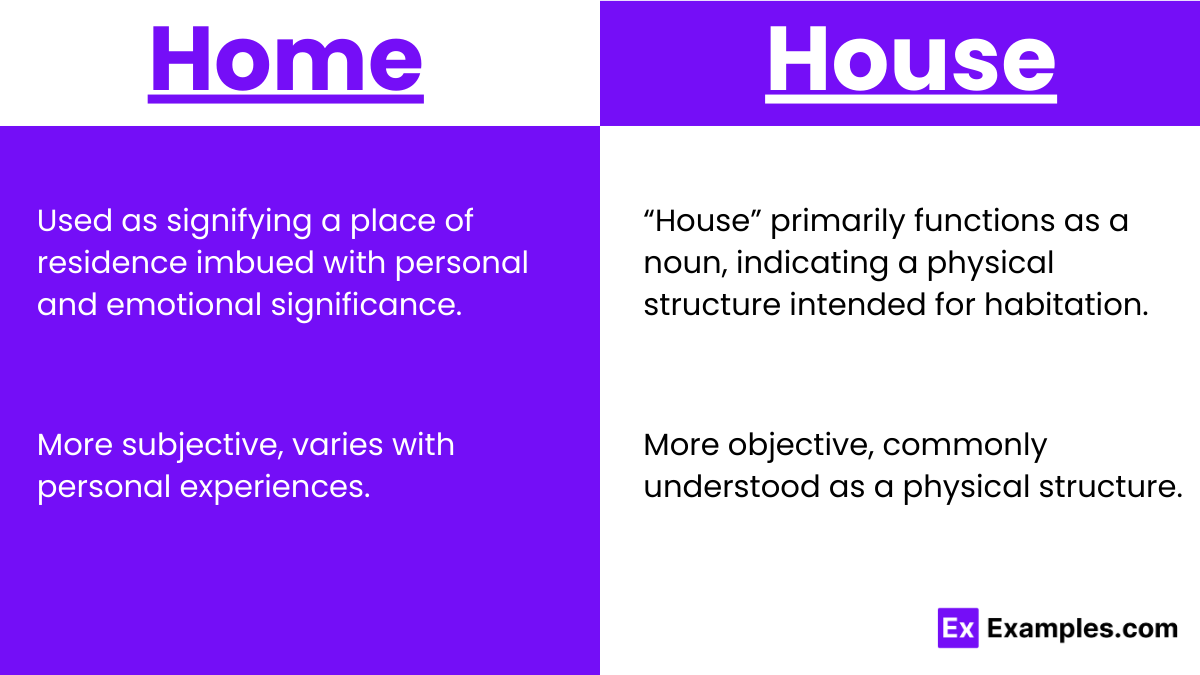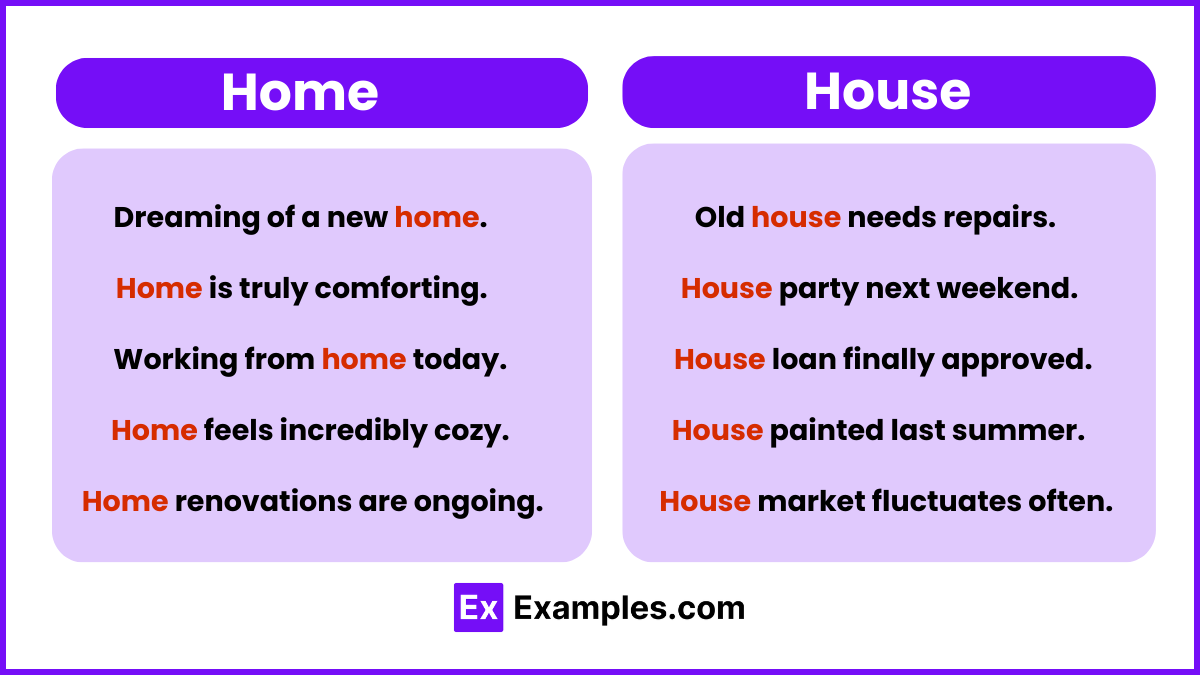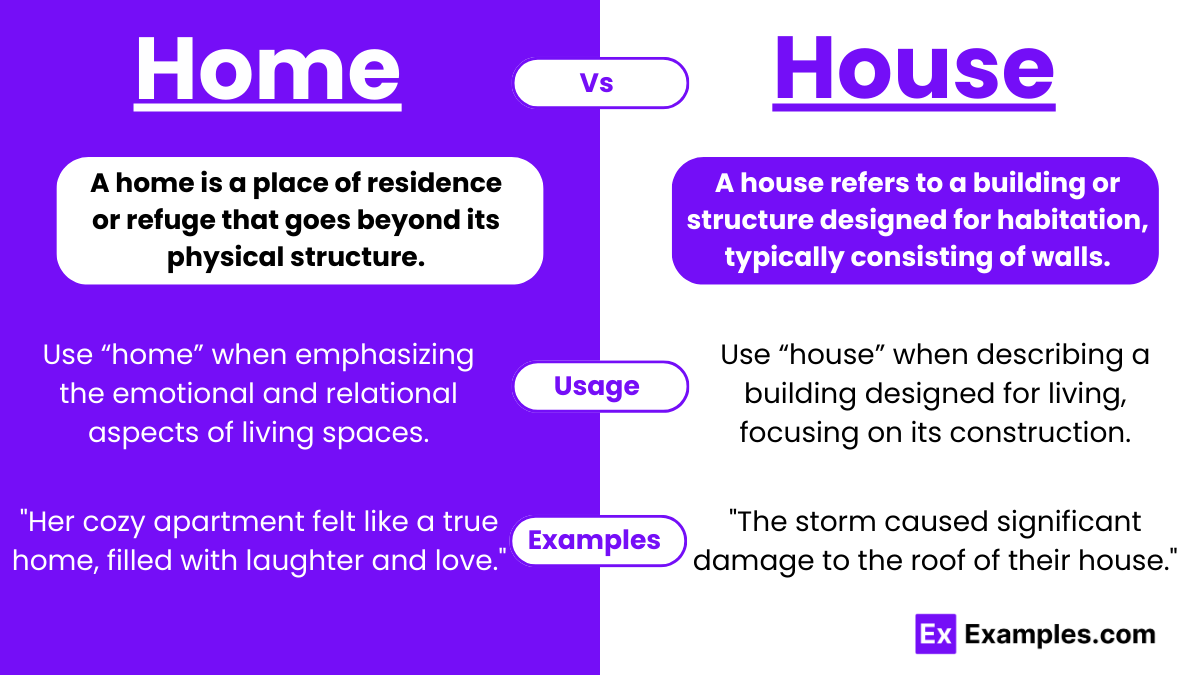Home vs House – Meanings, Difference, Examples, Usage
When discussing where we live, the terms “home” and “house” are often used interchangeably, yet they convey fundamentally different concepts. A house refers to a physical structure, a tangible building made of materials like brick, wood, or concrete, designed to provide shelter and accommodate human activities. Conversely, a home transcends the mere physical boundaries of a house. It embodies the emotional, psychological, and personal significance attached to a living space. This article delves into the nuances between a house and a home, exploring how each term captures different dimensions of our living spaces.
Home and House – Meanings
- Home: A home is a place of residence or refuge that goes beyond its physical structure, embodying emotional, psychological, and sentimental value. It’s where individuals or families create memories, share experiences, and build a sense of belonging and comfort, often tied to feelings of love, security, and personal identity.
- House: A house refers to a building or structure designed for habitation, typically consisting of walls, a roof, and various rooms to accommodate daily living activities such as sleeping, eating, and socializing. It is a physical entity, often regarded in terms of its architectural design, construction, and material value, without inherently conveying the emotional or sentimental attributes of a home.
Summary
A house refers to a physical structure or building where people live, characterized by its construction, design, and physical attributes. It is tangible, comprising walls, roofs, and rooms. On the other hand, a home transcends the physical aspects to embody a sense of comfort, belonging, and emotional attachment. It is where personal memories are made, relationships are nurtured, and a sense of personal safety and identity is established. While a house can be seen and touched, a home is felt and experienced, making these two concepts fundamentally different yet interconnected
How to Pronounce Home and House
- Home: Pronounced as /hoʊm/ (home), with a long “o” sound, making it warm and welcoming.
- House: Pronounced as /haʊs/ (house), with a pronounced “ou” sound, reflecting its more structural and tangible nature.
Differences between Home and House
| Aspect | Home | House |
|---|---|---|
| Nature | Emotional and relational. | Physical and structural. |
| Focus | Personal comfort and identity. | Architectural design and functionality. |
| Attachment | Emotional and personal. | Primarily legal and financial. |
| Flexibility | Defined by the people and relationships within. | Defined by its construction and layout. |
| Usage | More subjective, varies with personal experiences. | More objective, commonly understood as a physical structure. |
How to Remember the Difference between Home and House
To remember the distinction, associate “home” with the heart and emotions—it’s where you feel a sense of belonging and comfort, beyond the physical attributes. On the other hand, think of a “house” as the tangible, structural entity—a building designed for people to live in, irrespective of the emotional connections.
When to Use Home and House

Usage of Home
- Emotional Connection: Use “home” when emphasizing the emotional and relational aspects of living spaces, where warmth, comfort, and personal identity are central.
- Example: “No matter where I travel, my home always has a special place in my heart.”
- Personal Environment: “Home” is suitable when referring to one’s living environment, shaped by personal tastes, memories, and relationships.
- Example: “She has made her apartment a true home with personal touches and family photos.”
- Feeling of Belonging: The term “home” is used when there’s a strong sense of belonging and personal attachment, regardless of the physical space’s size or luxury.
- Example: “After a long journey, there’s nothing like the feeling of coming home.”
Usage of House
- Physical Structure: Use “house” when describing a building designed for living, focusing on its physical attributes and construction.
- Example: “They recently bought a house with a large backyard and a garage.”
- Real Estate Context: “House” is appropriate in real estate and architectural contexts, where the emphasis is on the building’s design, structure, and functionality.
- Example: “The open house will showcase the newly renovated kitchen and bathrooms.”
- Legal and Financial Aspects: The term is also used when referring to legal and financial transactions related to residential buildings.
- Example: “They are finalizing the paperwork to become the new owners of the house.”
How to use Home and House
Using “Home”
- As a Noun: “Home” is commonly used as a noun, signifying a place of residence imbued with personal and emotional significance.
- Example: “After months abroad, he finally returned home.”
- In Idiomatic Expressions: “Home” appears in various idioms and expressions that convey comfort, security, and belonging.
- Example: “Home is where the heart is.”
Using “House”
- As a Noun: “House” primarily functions as a noun, indicating a physical structure intended for habitation.
- Example: “The house at the end of the street is for sale.”
- As a Verb: In some contexts, “house” can be used as a verb, meaning to provide someone with shelter or a place to live.
- Example: “The program houses veterans in need of accommodation.”
Home and House – Examples

Examples of Home
- “Her cozy apartment felt like a true home, filled with laughter and love.”
- “He carried the concept of home with him, finding comfort in new cities.”
- “Their family home was a tapestry of shared memories and milestones.”
- “After a long day at work, Jessica looked forward to returning to her home, where she felt most at peace.”
- “The smell of freshly baked cookies filled the home, evoking warm childhood memories for Sam.”
Examples of House
- “The Victorian house on the corner has been declared a historic landmark.”
- “They are looking to buy a starter house in a family-friendly neighborhood.”
- “The storm caused significant damage to the roof of their house.”
- “The house at the end of the street, with its Victorian architecture, always caught the eyes of passersby.”
- “They decided to paint the house a bright shade of blue to make it stand out in the neighborhood.”
Synonyms
| Term | Synonyms |
|---|---|
| Home | Abode, haven, dwelling |
| House | Residence, building, property |
Exercise
Fill in the blanks with either “home” or “house” to complete the sentences accurately.
- They turned the old farmhouse into a welcoming __________, full of warmth and family history.
- The architect presented the designs for the new __________, emphasizing its sustainable features.
- Despite traveling the world, she always missed the comfort of her __________.
- The open __________ event attracted many potential buyers interested in the property.
- After years of renting, they were excited to finally own their own __________.
Answers.
- home
- house
- home
- house
- home
FAQ’S
What Makes a House Be Called a Home?
A house becomes a home when filled with love, memories, and a sense of belonging.
How Do You Use House and Home in a Sentence?
House: “They bought a new house in the city.” Home: “Their home is filled with laughter and warmth.”
Can Home and House Be Used Interchangeably?
Home and house are not always interchangeable; home implies emotional connection, while house refers to a physical structure.
Is It Correct to Say a Home?
Yes, saying “a home” is correct when referring to a place of comfort and emotional attachment.
What Is the Quote About a House vs a Home?
“A house is made of walls and beams; a home is built with love and dreams.”
What Is the Saying “A House Is Not a Home”?
The saying “A house is not a home” emphasizes that a true home requires love, warmth, and living presence.


